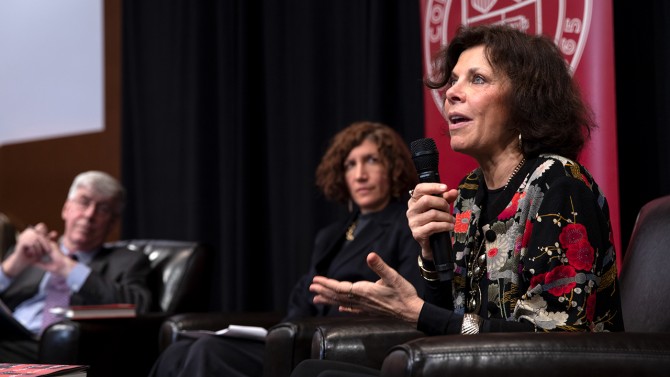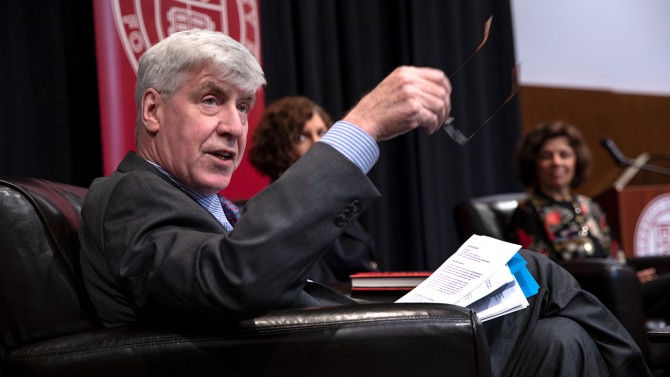Legal experts discuss hate speech and how to limit it
By Susan Kelley
Two pre-eminent legal scholars agree that hate speech is protected by the First Amendment under certain circumstances. But their opinions diverge on how most effectively to reduce hate speech incidents and their potential harmful impact.
Nadine Strossen, former president of the American Civil Liberties Union and professor of law at New York Law School, and Jeremy Waldron, professor of law at New York University, brought differing points of view to the topic of hate speech April 10 in Myron Taylor Hall. Sherry Colb, professor of law at Cornell Law School, moderated the discussion.
Both Strossen and Waldron agreed that the First Amendment protects hate speech – but not when it satisfies what is known as the “emergency principle.” When the hate speech poses a threat that can only be averted by suppressing the speech, it is punishable under U.S. law. “And the sad fact is a lot of hate speech does satisfy the emergency principle: It constitutes a general threat or targeted harassment or hostile environment harassment or an intentional incitement of imminent violence,” Strossen said.
However, Strossen and Waldron disagreed about the best way to deal with hate speech. Strossen said the best remedy is free speech and counter speech, while Waldron advocated for laws that would prohibit hate speech.
Historically around the world these laws have disproportionally singled out the dissident views of minority speakers and groups, Strossen said. “That is not a coincidence. After all, these laws are enforced by the government, or by the university if we’re talking about a public campus, which is accountable to the majority, not accountable to minority groups,” she said.
Just as important as avoiding censorship laws is the need to resist hate speech with free speech, “… which I am convinced will do more to counter the scourge of hatred,” Strossen said.
Waldron described the way legislators around the world have defined hate speech. (The U.S. is the only liberal democracy without laws or codes against it.) It’s tempting, he said, to think we can define hate speech, as we do hate crimes, in terms of the motivation of the speaker.
But most advanced democracies do it the other way around: They prohibit speech that is likely to elicit, generate, incite or cause hate, Waldron said. This type of legislation is “looking for the effect of speech and the impact that it’s going have on the community, rather than it just being a cathartic expression of hatred by the person speaking,” he said. “I think it’s a reasonable task to put before our legislators that they do what they can to prevent the fomenting of intercommunal hostilities between social and religious groups. … That sort of poisoning of the social atmosphere is something that legislators have the social responsibility to worry about.”
The campus context is different because it is a community of free inquiry, “a place for speaking,” he said. And it is a place where, in living memory, mobs have screamed ugly epithets at members of some groups trying to get an education. “Campus administrators might reasonably think that they have to balance their obligations to free speech … with the possibility that the environment might be polluted, poisoned, in this way,” he said.
Strossen countered by saying India, for example, which has laws prohibiting hate speech, has seen many examples of politicians launching hate speech charges against their adversaries. Ironically, the laws have done more to stir up intercommunal violence than to alleviate it, she said.
Waldron pointed out that many countries have laws that prohibit group libel, such as defamation of a minority group. These laws offer the basic assurance of inclusion in society for all members, he said.
However, the group libel approach can be used against minority speakers, Strossen said. For example, a gay-rights organization in Paris was heavily fined for describing the leader of an anti-gay group as a “homophobe” – a term that was considered to be a defamatory slur.
And the group libel approach requires proof that the libel charge is false, which can have troubling consequences, Strossen said.
“You’re just giving a platform to the hate mongers to trot out whatever evidence they assert they have to substantiate their discriminatory views … and then play the role of being a persecuted martyr under the laws,” she said. “It worked for the Nazis, by the way, who were repeatedly prosecuted in Weimar Germany under the existing hate speech laws at the time.”
The event was the second in the Free Speech Presidential Speaker Series, initiated by President Martha E. Pollack. The series is co-sponsored by the Cornell Law School.
Media Contact
Get Cornell news delivered right to your inbox.
Subscribe


